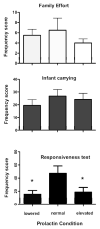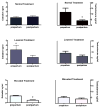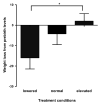Prolactin's mediative role in male parenting in parentally experienced marmosets (Callithrix jacchus)
- PMID: 19664636
- PMCID: PMC2761515
- DOI: 10.1016/j.yhbeh.2009.07.012
Prolactin's mediative role in male parenting in parentally experienced marmosets (Callithrix jacchus)
Abstract
Prolactin has been implicated in promoting paternal care behaviors but little evidence of causality has been found to date except for birds and fish. This study was designed to examine the possible causal relationships between prolactin and male parenting behaviors, reproductive hormones, and physical changes in cooperatively breeding common marmosets, Callithrix jacchus. Fifteen parentally experienced fathers were studied over three consecutive infant care periods during two weeks prior and three weeks following their mates' parturition under three-treatment conditions: normal control pregnancy, decreased prolactin and elevated prolactin. The treatments significantly altered the serum prolactin levels in the fathers. Using three methods of determining a father's level of parental care: infant carrying, family effort and responsiveness to infant stimulus tests, we found that only the male response to infant stimuli was altered by the hormone treatments. Lowering prolactin significantly reduced male responsiveness to infant stimuli but elevating prolactin showed the same effect. Hormonal sampling indicated that testosterone levels showed an inverse relationship to prolactin levels during a normal peripartum period and prolactin treatment reduced this relationship. Prepartum estradiol levels were significantly elevated during the lowered prolactin treatment and estradiol was significantly lowered postpartum with the elevated prolactin treatment. Father's weight decreased significantly by the third week of infant care during the normal treatment. Males in the elevated prolactin treatment lost little or no weight from prepartum while in the lowered prolactin treatment showed the most weight loss. The present findings did not distinguish a direct causal relationship of prolactin on behavior in experienced fathers but did find an interaction with other hormones and weight gain.
Figures





Similar articles
-
Hormonal stimulation and paternal experience influence responsiveness to infant distress vocalizations by adult male common marmosets, Callithrix jacchus.Horm Behav. 2016 Feb;78:13-9. doi: 10.1016/j.yhbeh.2015.10.004. Epub 2015 Oct 21. Horm Behav. 2016. PMID: 26497409 Free PMC article.
-
Suppression of prolactin does not reduce infant care by parentally experienced male common marmosets (Callithrix jacchus).Horm Behav. 2006 May;49(5):673-80. doi: 10.1016/j.yhbeh.2005.12.009. Epub 2006 Feb 9. Horm Behav. 2006. PMID: 16480723
-
Hormones associated with non-maternal infant care: a review of mammalian and avian studies.Folia Primatol (Basel). 2000 Jan-Apr;71(1-2):6-21. doi: 10.1159/000021726. Folia Primatol (Basel). 2000. PMID: 10686483 Review.
-
Male parenting and response to infant stimuli in the common marmoset (Callithrix jacchus).Am J Primatol. 2008 Jan;70(1):84-92. doi: 10.1002/ajp.20460. Am J Primatol. 2008. PMID: 17607701
-
Primate paternal care: Interactions between biology and social experience.Horm Behav. 2016 Jan;77:260-71. doi: 10.1016/j.yhbeh.2015.07.024. Epub 2015 Aug 4. Horm Behav. 2016. PMID: 26253726 Free PMC article. Review.
Cited by
-
Fathering style influences health outcome in common marmoset (Callithrix jacchus) offspring.PLoS One. 2017 Sep 28;12(9):e0185695. doi: 10.1371/journal.pone.0185695. eCollection 2017. PLoS One. 2017. PMID: 28957433 Free PMC article.
-
Differential hypothalamic secretion of neurocrines in male common marmosets: parental experience effects?J Neuroendocrinol. 2012 Mar;24(3):413-21. doi: 10.1111/j.1365-2826.2011.02252.x. J Neuroendocrinol. 2012. PMID: 22070606 Free PMC article.
-
Hormonal stimulation and paternal experience influence responsiveness to infant distress vocalizations by adult male common marmosets, Callithrix jacchus.Horm Behav. 2016 Feb;78:13-9. doi: 10.1016/j.yhbeh.2015.10.004. Epub 2015 Oct 21. Horm Behav. 2016. PMID: 26497409 Free PMC article.
-
Population Pharmacodynamic Models of Risperidone on PANSS Total Scores and Prolactin Levels in Schizophrenia.Pharmaceuticals (Basel). 2024 Jan 23;17(2):148. doi: 10.3390/ph17020148. Pharmaceuticals (Basel). 2024. PMID: 38399363 Free PMC article.
-
Variation in prolactin is related to variation in sexual behavior and contact affiliation.PLoS One. 2015 Mar 23;10(3):e0120650. doi: 10.1371/journal.pone.0120650. eCollection 2015. PLoS One. 2015. PMID: 25799436 Free PMC article.
References
-
- Almond EA, Ziegler TE, Snowdon CT. Suppression of prolactin does not reduce infant care by parentally experienced male common marmosets (Callithrix jacchus) Amer J Primatol. 2006;70:560–565. - PubMed
-
- Altmann J, Samuels A. Costs of maternal care: Infant-carrying in baboons. Behav Ecol & Sociobiol. 1992;29:391–398. doi: 10.1002/(SICI)1096-8644(199809)107:1<71. - DOI
-
- Amann RP. The cycle of the seminiferous epithelium in humans: A need to revisit? J Androl. 2008;29:469–487. - PubMed
-
- Baptista T, de Baptista EA, Lalonde J, Plamondon J, Kin NM, Beaulier S, Joober R, Richard D. Comparative effects of the antipsychotics sulpiride and risperidone in female rats on energy balance, body composition, fat morphology and macronutrient selection. Prog Neuropsychopharmacol Biol Psychiatry. 2004;28:1305–1311. - PubMed
Publication types
MeSH terms
Substances
Grants and funding
LinkOut - more resources
Full Text Sources

